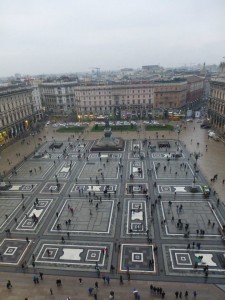
There I was, sitting in a nice outdoor cafe in Amsterdam this past weekend. The weather was just right to enjoy a cappuccino in the afternoon sunlight with a crisp breeze bringing the promise of a late fall.
The chairs were placed behind the tables so I could look out as people passed by on the bustling street with the backdrop of the towering Westerkerk steeple. As I waited for my friend, I decided to pull out the latest issue of my PRSA Tactics newspaper and do some reading.
My travel bookbag was unzipped but flipped over and resting on the ground by my legs. As I read about Lebron James’ much better return to Cleveland than his departure a few years before, a man came and sat at the table next to mine, two chairs down. I paid him no attention and continued to read.
My line of sight as I was reading was downward and right. I could see my bag in my peripheral vision. I noticed the man began to reach his left hand down. I assumed he had dropped something or was scratching his leg, again not paying him much attention. As the waitress came by to take his order in Dutch, this is when I began to suspect something wasn’t quite right. First, he shot up from his downward lounge like he was caught and he rushed through his order.
I continued to keep my eyes on the newspaper, though I was no longer reading but watching him out of the corner of my eye. Again, he began to slouch to his left. I realized then he was going for my bag. I hesitated just a moment longer, making sure his hand was touching my bag.
I slammed my paper closed and loudly smacked it on the table. He, of course, was surprised and jerked back as if I had hit him with a bolt of electricity. I snatched my bag up quickly and gave him the meanest look I could muster. The one that I like to think can stop would-be thieves in their tracks, turn people into frozen statues that I would only have to tap to shatter into a million pieces.
He looked back, clearly caught in the act, and quickly got up and walked away. About 100 meters down the street, he turned to look back. I suppose he was waiting to see if I was going to chase him or yell for the nearest police officer. I just continued to give him the mean eye.
I suppose I could have made a bigger ruckus. Screamed what a lousy purse snatcher he made – I could see my bag the entire time. Threw my hot cappuccino in his face maybe. I’m not one for the hassle of undue drama, though, so I felt satisfied with the results of protecting my belongings. I made sure, however, to keep my bag under my feet and zipped for the rest of the trip.
Travel scams suck
I’m not the most vigilant traveler. Really, I’m just plain oblivious to much that is going on around me, daydreaming in my own little world. I have gotten better about this in recent years, taking more heed of my father’s many warnings from family trips of long ago and learning new tricks from Chris.
I’m extremely lucky more hasn’t happened to me than one successful and one recovered pickpocketing experience. There have been plenty of encountered attempts, though, and I hope my experiences from cities all over the world will help you avoid these potential trip killers.
Paris – Don’t sign the petitions
At my first trip to the Eiffel Tower, I was approached by no less than four young girls of Eastern European descent. They listen for those speaking English. They have a clipboard in hand with pen, and they tell you they are with some world-saving organization (Save the Whales, Feed the Children, Protect the Rainforest, etc.), and will you please sign this petition to help their cause?
What it really is
As you take pity for the hungry pandas or sick puppies and begin to sign, one of the girls has moved behind you. She will then pickpocket you, taking whatever she can discreetly out of your backpack or pockets. The petition is a distraction for the theft.
What to do
Say no and keep walking. Whatever you do, don’t stop. They will sometimes, not typically though, reach out and grab your arm to halt you. Shake them off and keep going. Don’t become violent with them. Wave your hand aggressively saying no and keeping walking.

Fes – Don’t watch the show
As we walked through the dizzying and narrow alleyways of the ancient Medina in Fes, Morocco, we constantly encountered children doing some acrobatic stunt. After their performances, they would then stick out their hands for some form of payment.
What it really is
Though not so devious, after the child has performed a flip or spider walked up a wall, he wants you to give him a tip. The problem is, when you give him dirham or two ($1 USD = about 9 Moroccan dirhams), he’ll demand more, sometimes up to 10 dirhams.
What to do
If at all possible, try to avoid the stunt. With the tight walls, though, that can be prove difficult. If you can’t avoid the stunt, pay the child whatever you feel reasonable and keep walking. Even after he tries to block your way and demands more money, push through and keep walking. He won’t follow you, instead focusing on the next tourist.
Istanbul – Don’t cave to high pressure sales techniques
If you enter any shop stall in Istanbul, you’re likely to be taken to the owner’s “cousin” who runs a nearby rug shop with the “finest handmade rugs in the country.” You’ll be sat in a showroom and offered Turkish tea and treats. Young men who work for the “cousin” will bring out hundreds of carpets and roll them out for your viewing pleasure. The owner will point out the finest intricacies of the threadwork, even show you how is “aunt” is sitting at the loom making these very rugs by hand.
When you find one you like, the negotiations will begin. The owner will show you a calculator with a steep price (he’ll never say the price out loud), and you will be expected to negotiate to a reasonable price. As negotiations go on, he will tell you all the woes of his family. How he needs to make this sell, how you’ll never come back later, and you’ll never find a better price. This is high-pressure sales techniques at their best (or worst).
What it really is
This is the least of the scams because it’s actually true and just part of the culture. Many families own a series of businesses in the Turkish Bazaar and will take you to the other shops. It’s also a a cultural expectation to accept the tea, watch the show of rugs, and haggle. You can be deemed rude if you don’t participate.
What to do
Embrace these sales techniques as part of the culture. Enjoy it for what’s it’s worth, but do set your limit. Don’t go over that limit, and if the seller isn’t willing to meet you, walk. They will typically chase you and meet your limit or add something to the mix. Don’t let the high pressure or appeal to the guilty conscious affect your decision. If you decide you don’t want to purchase anything, then thank the merchant for the tea and hospitality and leave. Don’t turn back.

Shanghai – Don’t be escorted to the tea houses
Chinese people can be some of the nicest people you meet, but beware the tag team photo takers. Two young girls or a young couple will ask you if you can take their photo in front of some touristy attraction. After you do so, they will strike up a conversation with you. Where are you from? What are you doing in China? Do you like it so far? Here’s the telltale questions to be on the lookout for: Can we practice our English with you?
These couples pretend they have learned English and they just want to practice. Sure, you says. They seem like some nice people. Great! They know just the place to go so you can talk. There is a nice tea house where you can get traditional Chinese tea and chat.
What it really is
Once you arrive at the tea house, which is down a confusing path of back alleys, the couple will order a series of tea to enjoy while you talk. When it’s time to go, the owner will bring the bill and the couple will tell you it’s customary in China that the guest pays or they don’t have any cash. Can you pay the bill and they will pay you back later? The bill is exorbitant. If you refuse to pay, the owner will threaten to call the police.
The truth is, these people are actors hired by the tea house to bring unsuspecting tourists like you in. They are getting paid a portion of your bill. Most likely, the owner isn’t going to call the police because most of the officers know the scam and know the establishments that run it. In China, though, you can never be sure if the police are in on the scam.
What to do
If you are approached by the likes of such “nice folks,” refuse to go with them. Be polite, take the photo, and move along. If you think they may be genuine, then go to a touristy place, like Starbucks, to “practice English.” Never go to the tea house they suggest. There are too many legit tours that you can take to encounter an authentic tea ceremony.
If you do find yourself in a sketchy tea house in this situation, then only pay the portion of the bill that is yours. You’ll still be screwed since your teas will be much higher than what’s reasonable. Hand the money that you owe for what you consumed to the waiter and leave. Do your best to get back to a touristy area and out of the back alleys.
Barcelona – Don’t leave anything on the table
You’re sitting at a lively plaza in Barcelona, sipping a café con leche and people watching. You have your mobile phone or camera on the table, taking photos and uploading to Instagram. Suddenly, you’re approached by a young sister and brother asking for money or girls like in Paris with a petition. They’ll put their hat or clipboard on the table, asking for you to give or sign.
When you refuse, they slide their belongings back and go about their way. You continue to people watch, reaching for your camera for a great shot of an old man and woman making their way across the plaza. It’s gone.
What it really is
Anytime you leave something of value out in plain sight, even when it’s at your fingertips, you become a target. The hat or petition or anything else that could be used to cover up the valuables are a disguise to slip your valuables off the table without you noticing. When the culprits pull their belonging back, they are also taking your belongings with them.
What to do
Don’t leave anything on the table. Keep your camera or mobile phone or whatever else in your lap or in your hands. If you do have something on the table, if anyone approaches you, put your hand on it immediately. This prevents a slight of hand taking your stuff.

Rio de Janeiro – Hold onto the menu
It’s a great day on the beach, and there are tons of beachfront restaurants offering tables and chairs in the sand. You can sit and eat as you watch the waves roll in. After you look at the menu, make a selection that fits your budget, you place your order and hand the menu back to the waiter.
After a lovely lunch and some relaxing, you’re ready to hit the waves again. You ask for the bill, and when it arrives, the prices are three times what you saw on the menu.
What it really is
You’ve received the tourist price. You’ll ask to see the menu again, and another version of the menu with higher prices will be brought. The original menu you saw with the much lower prices is nowhere to be found. If you refuse to pay the higher prices, the waiter will threaten to call the police. This happens all over Brazil, and the police are many times in on the travel scams.
What to do
Keep your menu. Even after you’ve ordered and the waiter asks for it back, tell him you want to keep it. If he is really aggressive about getting the menu back, then it’s a sign this is a two-menu establishment. Leave. If nothing else, take a photo on your phone of the menu you order from.
Chris and I walked out of such a restaurant in Recife after we picked up a menu on a table where locals had been dining, and the waiter ran over to snatch the menu from us and handed us another one.
Mumbai – Watch the taxi driver
When Chris went to India in 2011, he was warned about the taxi drivers. Many would claim their meters were broken but they could negotiate a price. When giving money to pay the amount, they would switch bills.
What it really is
The meter isn’t broken, and the driver knows he can negotiate a higher price to get you to your destination. You pay the fare with one denomination only to be given change for a lower amount. When you argue, the driver shows you the lower bill.
What to do
Refuse to enter a taxi until you see the meter is on. When you get in, demand the driver turn it on. If he gives you any excuse, don’t take the taxi.
If you do take a taxi with a meter that is sketchy, try to know beforehand how much your fare should be. Pay that amount to the driver and get out. Walk in the opposite direction of the traffic so he can’t follow you.
Watch the money exchange closely. Know what bill you give the driver, and be sure he gives you correct change. If he tries to switch the bill on you, be forceful and demand the correct amount. Most of the time, they will cave knowing they’ve been caught.

Milan – Don’t accept the free gift
As you admire the Duomo of Milan, you will encounter several friendly African men in the plaza. They will ask you where you’re from, how are you, and before you know it, they will tie a thread bracelet, much like the friendship bracelets you made in middle school, around your wrist. The entire time, they are saying this is a free gift from their country (Nigeria, Zimbabwe, Kenya, etc.).
What it really is
As you try to disentangle yourself from the situation and the bracelet, they will begin to demand 10 euros as a good faith gift for the bracelet. They have also double knotted these bracelets so you can’t just take it off and return it like you would with the flower vendors in New York City. Though the will not try to physically restrain you from walking away, they will certainly verbally try to hold you.
What to do
Do your best to avoid these men. When they approach you, just say no firmly and keep moving. Don’t stop for them. When they reach for your wrist, pull back and say no. If they do put the bracelet on you, just tell them you’re not paying anything for it and keep moving. Try to get into a crowd away from them. If you feel compelled, then give them an euro but refuse anything more. These are literally strings they are trying around your wrist, nothing special. One other technique is to already have enough other bracelets on they can’t tie the string around.
Prague – Know what you buy
You’ve found the perfect souvenir in mint condition. You take it to the register and make your purchase with no hassle. When you return to your room after a day of exploring, you’re admiring your day’s finds when you notice the souvenir looks different than when you bought it in the store.
What it really is
Many times, merchandise on the floor is the premium products. When you go to the register, though, the merchant switches your item with a less-than-stellar or used piece.
What to do
Watch the merchant carefully. Make sure he’s putting the item you selected into your bag. If you can’t see behind the counter, when he hands you your bag, pull out the item and inspect it. If it’s in any way different that what you selected, demand the merchant to give you the item you purchased or get another off the floor, leaving the damaged one on the counter. Then walk out.

New Orleans – Don’t play the guessing game
You are walking down Bourbon Street, admiring all the crazy sites to see. You’re approached by a man who swears to you he can guess your exact age, weight or some other impossible feat. He evens makes a $20 wager on this extraordinary talent of his.
You may think there is no way you can lose this bet. So you take it. He then makes some blindly obvious statement and demands payment.
What it really is
It’s a game that he can’t lose because the answer applies to anyone. The one I’ve witnessed goes like this:
Scam artist: I bet you $20 I can tell you exactly where you got those shoes.
Unsuspecting tourist: Ok, where?
Scam artist: You got those shoes on your feet on Bourbon Street in New Orleans, Louisiana, USA.
Technically, he’s done exactly what he said he would do, and he will physically and verbally demand payment.
What to do
Don’t play. If you’re approached by one of these scam artists, say no and keep walking. Don’t out their game, either, as you’ll bring their ire upon yourself.
What travel scams have you encountered?
These travel scams and more can ruin any trip. Though I’ve paired them with cities where we’ve seen them, they can happen anywhere. Be on the lookout and don’t become a victim.
What other travel scams have you experienced? How do you prevent falling victim to these tricks of the trade?
-Monica

Very interesting article. I Have experienced the same in Duomo 😀
Costa Rica: When in Capital city, San Jose. Watch out for aggressive Taxi drives trying to speak to you in bad english and adding some spanish. Some even stop their car in hope, that you will stop and listen them. They only like to sell you tour around the city for very high price.They will offer to take you to restaurants or gentlemen clubs. Usual target older American men.
What to do ?
Walk away and say no. Don’t stop.
Thailand, Bangkok:
Grand Palace. When you arrive here you are greeted with fellow who tells you are not allowed to enter, because your shoulders are not covered or knee is visible.
What it really is ?
Guy is trying to tell you to come back after one hour and they can borrow you clothes. Mean while he directs you to tuk tuk driver who offers to take you to river cruise for only 1000 baht.
What to do :
Just walk past the guy as they lent clothes in palace for deposit. Don’t listen the fellow. Palace is cool place, but its priced free for Thai people and foreigners pay higher price.
Thailand, Krabi
Maybe most common taxi scam. We were there on low season. Driver notice we were bit sleepy and drives us to tourist tour company and tells your hotel is not yet available. Guy comes from office and offers private tours for next day.
What it really is ?
Place lives on tourism, so during low season there are not that much money making opportunities around. Guys are just trying to make their living.
What to do ?
Just say no. If you are interested about the tour you can bargain it for better price. Else just say no thank you and taxi will take you to hotel were they greet you and give you the room
Malaysia, Kuala Lumpur
Dont take the blue taxi. Its tourist taxi and charged 50% more than normal.
When you arrive to airport there are counters where you can pay for whole journey in advance or take metered one. Malls have official taxi pick up points and always demand meter to be turned on. If driver wont accept take the next one.
Note. Malaysia is aiming to be developed country by 2020. But price discrimination is still done in many places according are you malay or not. Petronas Twin towers are 80 ringgit for foreigners and 25 for locals…
Thanks, Valtteri, for sharing your experiences. We’ve never been to any of these countries, but we would love to go. We’ll certainly be on the lookout now for these. We’ll especially take heed of the Bangkok scam as that’s high on the travel list for us.